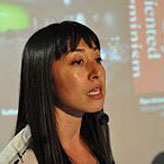IRWG Mcubed Research Incentive awarded to Mcubed 3.0 cube "The Future of Ethics, Society, and Computing"


September 26, 2019
The first IRWG-Mcubed Research Incentive was recently awarded to Mcubed 3.0 cube, "The Future of Ethics, Society, and Computing" (ESC). ESC is a collaboration between three investigators: Prof. Irina Aristarkhova (Art & Design), a scholar of technology and difference: aesthetic, cultural, sexual, political; Dr. Stephanie Rosen (Libraries), a disability studies expert also working in feminist and queer studies; and Prof. Christian Sandvig (Information) a researcher studying computing and social justice.
Mcubed distributes real-time seed funding to multi-unit, faculty-led teams. The Mcubed Incentive Program provides a mechanism for U-M units to find faculty teams that are working in a particular area; and/or incentivize the formation of cubes to explore the area of interest.
The IRWG Incentive offered additional funding, studio and event space, and access to IRWG’s Expert Advisory Panel—over 150 faculty leaders in the area of women, gender and sexuality.
 The additional support from IRWG will be used to sponsor an artist-in-residence for Fall semester. Katherine Behar is an interdisciplinary media and performance artist and Associate Professor of Art at Baruch College. She is known among scholars of gender for her work connecting art and feminist theory and for her artistic practice that interrogates technology and topics such as appearance, body image, obesity, gender identity, and race.
The additional support from IRWG will be used to sponsor an artist-in-residence for Fall semester. Katherine Behar is an interdisciplinary media and performance artist and Associate Professor of Art at Baruch College. She is known among scholars of gender for her work connecting art and feminist theory and for her artistic practice that interrogates technology and topics such as appearance, body image, obesity, gender identity, and race.
The ESC cube discovered a number of exciting synergies between Behar's current program of work and their own. Behar's current focus is "Artificial Ignorance."
In her words:
Artificial Ignorance theorizes the unprecedented capacities of digital technologies together with the fuzzy analog irregularities that persist—and even proliferate—in them. This retronymic approach to understanding AI technologies inverts expectations that “intelligence” and knowledge production would be core functions of digital computational practices. Artificial Ignorance asks such questions as: of what to remain willfully ignorant? How do AI-enabled interactions script humans into ignorance? How do AI technologies overlap with and differ from the autonomic filtering capacities of human cognition?
Artificial Ignorance approaches these questions in their ethical dimension, exploring specifically how AI-enabled systems are perhaps most human-like in implementation, that is when, like us, they fail to live up to intelligence’s ideals, and behave ignorantly. This considers sensing technologies from an object-oriented feminist perspective, imagining nonhuman companionship as an alternative to the “privacy vs. security” surveillance narratives that usually accompany discussions of drones and digital sensors.
Behar will spend her time at U-M collaborating with the ESC cube and building robots for an upcoming exhibition. IRWG’s support includes financial support, as well as studio and office space in Lane Hall for Behar to work, and administrative, technical, and event-planning support for this collaboration.
Stay tuned for more information about upcoming public events related to this project!
Learn more about Mcubed.

pictured above: The Future of Ethics, Society, and Computing Cube - Christian Sandvig, Irina Aristarkhova, and Stephanie Rosen
